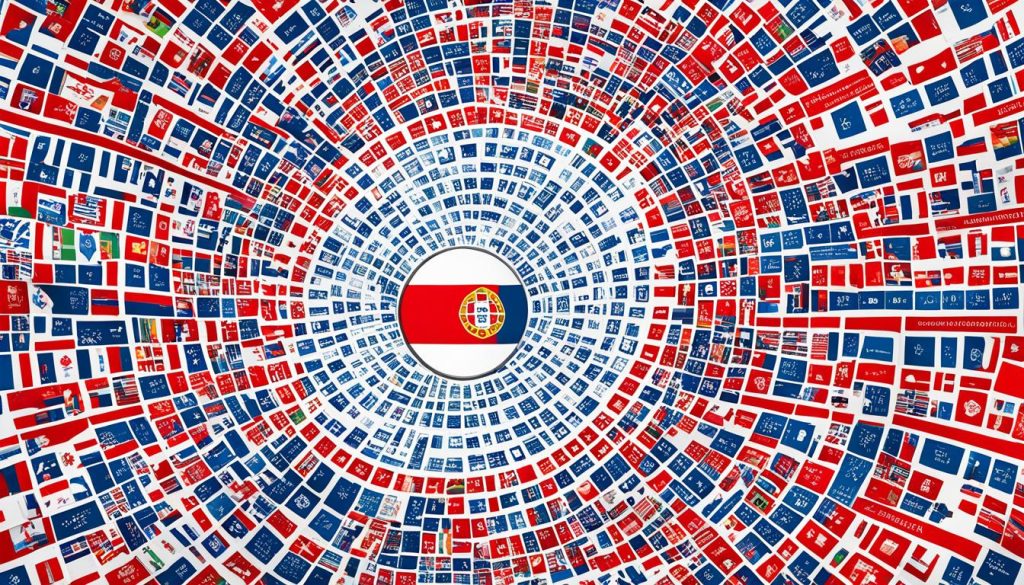When looking into what sets business models in Portugal apart from international corporates, it’s key to understand the special traits they each have. Each business type is influenced by its own culture and the specific market it operates in. This analysis highlights the main differences, such as the size of their operations and the strategies they use in different economic conditions.
It also looks at how they meet rules and support the world economy. Through this, we can see the clear contrasts in how they run and manage their activities.
Key Takeaways
- The scale of operations significantly varies between Portuguese businesses and multinational corporations.
- Cultural influences play a crucial role in shaping corporate culture differences.
- Distinct strategies are employed to navigate diverse market dynamics.
- Adherence to regulatory requirements differs between local and global enterprises.
- Both business models contribute uniquely to the top global economy.
Introduction to Business Structures in Portugal and Multinationals
The business scene in Portugal is quite different from that of multinational corporations. Portuguese companies often include family-owned and medium-sized businesses. Meanwhile, multinationals work under complicated structures because they are active worldwide. By comparing their business models, we can understand how they adapt and succeed in their specific settings.
Portuguese Business Overview
Traditional, family-owned businesses are common in Portugal. They blend old practices with new ideas to keep up with the competition. Their business models are simple, with a strong hierarchy and a local market focus.
Multinational Business Overview
On the other hand, multinational companies have complex and often spread-out structures. This setup helps them handle their international operations effectively. They are skilled at adjusting to different market rules and cultural differences while staying consistent globally.
Historical Background and Evolution
The commercial world of Portugal has really changed, growing from a local to a global trader. This change started centuries ago, with Portugal’s success in sea voyages making it a key maritime power. Learning about Portugal business history helps us see how the country’s business has evolved. It shows us how local and international markets play a role today.
Historical Development in Portugal
Portugal’s market history is fascinating. In the 15th century, its explorers found new trade routes. This brought wealth and turned Portugal into a centre for trade. The nation thrived on trade from its colonies, boosting industries like textiles and wine. By the 20th century, Portugal modernised its industry, attracting big investments. EDP and Sonae are great examples of how local and international money can work together, creating a strong economy.
Global Expansion of Multinational Enterprises
Multinationals have grown a lot, just like in Portugal. They started flourishing in the industrial revolution, thanks to new tech and capitalism. Companies like Unilever, Nestlé, and Ford show this growth. They went from national to international success. With better ways to communicate and transport goods, these companies changed global business. They’ve impacted trade and economic policies all over the world.
| Aspect | Historical Development in Portugal | Global Expansion of Multinational Enterprises |
|---|---|---|
| Origins | 15th-century maritime explorations and colonial ventures | Industrial revolution and technological progress |
| Key Industries | Textiles, wine, naval construction | Consumer goods, automobiles, technology |
| Modern Examples | EDE, Someone | Unilever, Nestlé, Ford |
Organisational Culture: Portuguese vs Multinational Companies

A study of corporate culture reveals differences between Portuguese firms and global ones. In Portugal, rank and personal ties shape how companies run. They focus more on connections when making decisions.
Work Environment and Management Styles
Portuguese firms have a formal setup and clear authority lines. Managers follow a top-down method, respecting elders and experience. In contrast, global companies have varied management styles. They encourage teamwork and open discussions.
Management styles affect work settings a lot. Portuguese companies value loyalty, while global firms prize innovation. This leads to different expectations of how employees should act and interact at work.
Impact of National Culture
Culture greatly influences how businesses operate. In Portugal, the focus on family and social ties impacts business, leading to a caring management style. It’s about stability and looking after each other.
Multinational companies, however, work across multiple cultures. This requires them to be more adaptable and open. They embrace diversity, making their workplace more vibrant compared to the traditional Portuguese firms.
Economic Impact and Market Presence
In recent years, analyzing the economic role of Portuguese companies has become very important. It’s vital to look at how these businesses strengthen the nation’s economy and create jobs. Even though they vary in size, their influence on the economy and job market is big.
Multinational corporations play a big role in the global market. They bring a lot of foreign money to Portugal and help the country join the global trade network. This connection is good for Portugal as it brings new technologies and better ways of doing things.
When comparing local and international firms, many things matter. Portuguese companies are closely tied to local traditions and what customers want. On the other hand, big international companies have a lot of resources and reach. They can change the way industries work.
| Aspect | Portuguese Businesses | Multinational Corporations |
|---|---|---|
| Market Influence | Predominantly local, strong cultural affinity | Global, with significant clout across various regions |
| Contribution to Portugal’s Economy | Employment, local market stability | Foreign investment, technological advancements |
| International Trade Dynamics | Limited but growing export capabilities | Extensive involvement in global supply chains |
Understanding the importance of both local and global companies helps us see their effect on Portugal’s economy. This knowledge is key to grasping how they influence not just Portugal but global trade too.
Regulatory Environment and Compliance
Understanding the regulations is key for businesses in different areas. This part will explore the main regulatory issues faced by businesses in Portugal. We will also look at the problems multinational companies have when following global rules.
Portuguese Regulatory Challenges
Portugal’s business rules are quite complex, mainly due to its detailed bureaucracy and local market laws. For new businesses, understanding these rules can seem very hard. They must deal with many legal details and steps.
Important points include tax laws, labour laws, and rules for specific sectors. For example, finance companies need to follow strict rules from the Banco de Portugal and the Comissão do Mercado de Valores Mobiliários (CMVM).
International Regulatory Standards
Companies working in many countries have to follow more complex rules. They need to obey local and global regulations. This requires advanced systems to manage the different legal needs in each place.
They must deal with rules like GDPR for data protection, international trade, and labour laws. For success, these companies work closely with legal experts. This helps them operate smoothly worldwide.
The table below shows the differences in rules for Portuguese businesses and international companies:
| Compliance Aspect | Portuguese Businesses | Multinational Corporations |
|---|---|---|
| Taxation Laws | Follow national tax laws | Must comply with tax laws of multiple countries |
| Labour Regulations | Adhere to local labour laws | Comply with international and local labour laws |
| Data Protection | Follow national data protection guidelines | Must adhere to GDPR and other international data laws |
| Market Entry Procedures | Local market entry regulations | Complex multi-country market entry protocols |
| Sector-Specific Regulations | Local sector-specific compliance | Global sector-specific compliance practices |
What is Portuguese vs multinational business?

Exploring Portuguese business means looking at its unique points and how it stands apart from international firms. Typically, these businesses are owned and run within Portugal, aiming at local or regional customers. They take cues from local culture and economic settings in deciding their strategies.
Multinational companies, however, work across borders. They have vast resources and push for a variety in strategy to reach worldwide markets. When we look into these entities, we see their knack for using different economies of scale, multiple funding sources, and strategies for spreading risk to stay globally active.
Here’s a table that contrasts key aspects of Portuguese and multinational firms:
| Attributes | Portuguese Businesses | Multinational Companies |
|---|---|---|
| Ownership | Locally owned and controlled | Globally owned with headquarters in multiple countries |
| Market Focus | Local or regional markets | International markets |
| Operational Scope | Limited to national boundaries | Extensive, with operations in multiple regions |
| Resources and Capital | Constrained by national economic conditions | Vast, with access to global financial markets |
| Strategy and Management | Culturally aligned with local practices | Adapted to diverse international environments |
This comparison sheds light on how each business model works in its environment. It shows that Portuguese enterprises do well in their local markets and stay true to their culture. On the other hand, multinational corporations are great at expanding globally and tackling varied market needs.
Key Financial Differences
It’s crucial to understand how Portuguese businesses and multinational corporations differ financially. We will look at how they manage their money. This includes examining taxes, the effects of government policies, and where they get their funds.
Taxation and Fiscal Policies
Portuguese companies face tough tax rules, influenced by the nation’s policies. Corporate tax can be high for small businesses. In contrast, big companies use global tax strategies to pay less tax. Local firms follow the national tax laws closely. Yet, multinationals use international rules to their advantage, avoiding double taxation.
Different Funding Sources
The ways businesses in Portugal and multinationals get money vary a lot. Local businesses often turn to banks, get government help, or European Union funds. These options have strict rules. On the other hand, big international firms have more options. They can get money from around the world, invest abroad, or work with big banks. This helps them grow and reach new markets.
Here’s a deep dive into Portugal’s financial tactics compared to global tax rules. We’ll see how these affect businesses in different ways.
| Aspect | Portuguese Businesses | Multinational Corporations |
|---|---|---|
| Taxation Approach | Compliance with domestic tax codes | Utilisation of global taxation strategies |
| Funding Sources | Local banks and EU funds | International capital markets and FDIs |
| Fiscal Policies Impact | Stringent national regulations | Exploitation of international agreements |
Human Resource Management
Human resource management (HRM) is key to making businesses more efficient and effective. It looks into managing staff in Portugal and the HR strategies used by global companies. The main points are on training employees and hiring them. It highlights the differences and similarities in these areas.
Employee Training and Development
In Portugal, companies design training programmes to meet regional and cultural needs. They focus on mentorship and learning while working. This helps employees get a deep understanding of the company’s culture and ways.
Global companies, however, use global training schemes to keep skills consistent worldwide. They use e-learning and regular training across countries. This approach ensures everyone has the same skills and encourages a global way of thinking.
Recruitment Practices
In Portugal, hiring is often more personal. Companies look for local talent through regional agencies and networks. They value personal recommendations and connections in their hiring.
On the other side, giant corporations embrace innovative hiring practices. They use newer tech, like AI for tracking applications and worldwide job sites, to find the best talent globally. They also focus on diversity and inclusion, aiming to create a varied workforce.
| Aspect | Local Portuguese Businesses | Multinational Corporations |
|---|---|---|
| Employee Training | Customised, Mentorship-focused | Global Frameworks, E-learning Platforms |
| Recruitment Practices | Personalised, Community Ties | Technology-driven, Global Talent Acquisition |
Operational Strategies and Efficiencies
Local Portuguese businesses and multinational corporations have different ways of working. These differences show in their day-to-day operations, how they manage their supplies worldwide, and how they focus on being efficient.
Local versus Global Operational Framework
Portuguese companies focus on the community and know the local market well. They tailor their operations for the needs of local customers. Multinationals, however, work on a global scale to make their operations uniform, which helps them grow and be more efficient. Their global approach helps them save costs, use resources better, and use advanced methods to stay efficient.
Supply Chain Management
For both local and international businesses, managing the supply chain is crucial for efficiency. Local businesses prefer working with nearby suppliers, which helps them adapt quickly to market changes. Conversely, multinationals manage a wide supply network from various places to cut costs and reduce risks. Handling a global supply chain requires advanced logistics and strong partnerships with suppliers worldwide.
Below is a comparative analysis highlighting key distinctions between local and global operational strategies:
| Aspect | Local Operational Pour Framework | Global Operational Pour Framework |
|---|---|---|
| Emphasis | Community Engagement | Standardisation |
| Scope | Regional | International |
| Supply Chain | Regional Suppliers | Diverse Global Suppliers |
| Efficiency Models | Ad Hoc Efficiency Initiatives | Advanced Business Efficiency Models |
Exploring these strategies sheds light on how different businesses succeed. Each approach, whether local focus or global supply chain use, highlights their strengths and the specific challenges they face today.
Market Entry and Expansion Strategies
Businesses looking to grow must think about entering new markets or growing in current ones. When entering the Portuguese market, local companies use their deep knowledge of the culture and laws. This helps them understand customers and navigate rules effectively, leading to growth.
On the other hand, big international companies use bold strategies for entering and growing in markets. They invest a lot in understanding the market, run big advertising campaigns, and use their worldwide networks to quickly make a strong impact. This shows how different the methods are between local firms and global ones.
The table below shows how Portuguese companies and big international firms use different strategies to grow:
| Strategies | Portuguese Market Entry | Multinational Expansion |
|---|---|---|
| Market Research | Focus on cultural details | Global insights with analytics |
| Promotion | Local targeted campaigns | Big, expensive adverts |
| Network Utilisation | Using local contacts | Using worldwide partners and distributors |
| Regulatory Compliance | Following national rules with local knowledge | Applying the best global practices for various laws |
Using the right strategies for market entry and growth is key for any company’s success. As markets change, companies must update their strategies accordingly. This is true whether they are entering the Portuguese market or expanding globally.
Use of Technology and Innovation
In Portugal, understanding how technology is used reveals insights into their business methods and innovation on a world scale. Companies in Portugal use technology to stay ahead and boost their impact in their area. This approach helps them remain competitive and influential.
Technological Advancements in Portugal
Portuguese firms are diving into new technologies by supporting startups through incubators and accelerators. The Web Summit in Lisbon shows Portugal’s dedication to tech growth, being one of the biggest tech events worldwide. They also use government support and partnerships to spark innovation.
Global Technological Integration
On the worldwide scene, big companies lead the way in adopting new tech. They use advanced technology like AI, machine learning, and blockchain to push global innovation forward. This approach helps them make processes better, improve customer experiences, and stay strong in the market globally.
Customer Relationship Management

Effective customer relationship management is key for businesses to keep and improve customer connections. It’s about knowing and meeting the needs of clients in ways that make them loyal and happy. In this section, we’ll explore how businesses in Portugal look after their customers and how big companies worldwide make sure their customers around the globe are satisfied.
Local Customer Service Practices
In Portugal, businesses really focus on personal, service-led ways to manage relationships with customers. They aim to form strong, personal bonds with clients, making sure to quickly and efficiently meet their needs. This close attention to customer relations often means meeting in person. This allows companies to really get to know what each customer likes.
Also, Portuguese companies use cultural insights to make their service better. By recognizing and valuing local customs, they make customers feel understood and respected. This way, they not only keep customer loyalty strong but also make the whole experience better for the customer.
Global Customer Satisfaction Strategies
On the other hand, big international companies cover a lot more ground and deal with various cultures. They need a more organized way to make sure they offer the same level of service everywhere. They use sophisticated CRM tools and data analysis. This lets them track customer interactions everywhere and adjust their plans as needed.
These large companies also run serious training for their teams all around the world. They make sure everyone follows the same customer service guidelines. This way, the company can serve a wide variety of customers while keeping the service great everywhere.
| Aspect | Portuguese Businesses | Multinational Companies |
|---|---|---|
| Customer Engagement | Highly personalised | Systematic and data-driven |
| Service Standards | Localised and cultural | Consistent and global |
| Client Interaction | Face-to-face | Multi-channel |
| Training Programme | Informal and traditional | Formal and extensive |
When we compare how Portuguese businesses and multinational companies manage customer relationships, we see both have their own strong points. Understanding these differences gives businesses valuable tips on how to better engage with customers, both in Portugal and worldwide.
Corporate Social Responsibility and Ethics
In today’s world, understanding corporate social responsibility (CSR) and ethics is key for businesses. Both Portuguese businesses and big international firms know the importance. They see the value in putting social responsibility first to grow sustainably and improve community impact.
In Portugal, companies care a lot about community impact and being green. They are driven by the country’s strong sense of community. They help local charities and use green ways of working. This builds trust and loyalty among their customers.
On the other side, big global companies take a broader view on ethical practices. They work across the globe, so they have to deal with different rules and cultures. To keep a good image worldwide, they run big CSR programs. These programs tackle many social and environmental challenges. This helps them stick to global rules and support sustainability worldwide.
Below is how Portuguese businesses and big companies compare in CSR and ethics:
| Aspect | Portuguese Businesses | Multinational Corporations |
|---|---|---|
| Focus Area | Community Impact, Local Environmental Sustainability | Global Sustainability, Diverse Social Issues |
| CSR Activities | Supporting Local Charities, Implementing Green Practices | Comprehensive CSR Programs, International Compliance |
| Ethical Practices | Localised Ethical Standards, Community Engagement | Adhering to International Regulations, Global Ethical Standards |
By looking at both local and global impacts, companies make their CSR efforts really meaningful. Ethical actions and a focus on the community do more than just help society and the environment. They also help build a business that is both sustainable and respected, whether it’s local Portuguese firms or big multinational ones.
Branding and Marketing: Portuguese vs Multinational Approaches
Portuguese companies and multinational corporations use different strategies in branding and marketing. This part explains how they each connect with their customers. We look at the specific practices of Portuguese businesses and global companies, showing their unique challenges.
Domestic Branding Techniques
Portuguese businesses focus on being true to their culture in their brand strategies. They highlight local traditions and values to win over the domestic market. They often use symbols and stories from the region, targeting the national pride of their audience. This makes people feel a special connection, building loyalty.
International Marketing Strategies
On the other hand, multinational corporations aim for a global approach in branding. They craft strategies that work across many cultures, using in-depth analysis to customise their messaging. Their branding carries universal themes but can be adapted for local tastes. This way, they keep their brand consistent globally, while effectively connecting with people from different cultures.
















